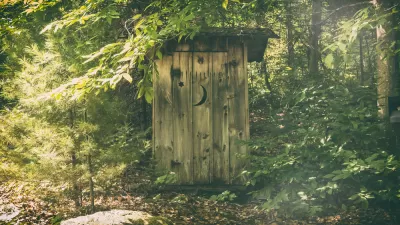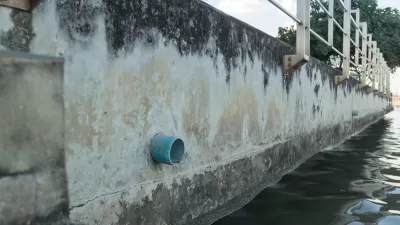In much of the world, people do not have access to toilets and sewers. To make these places safer, innovators look for cheap, easy-to-install solutions.

"Worldwide, 2.3 billion people don’t have access to a toilet," Alia Dharssi reports for Next City. Because traditional sewage systems can be expensive and take time to build, inventors are looking for ways to give people access to sanitary toilets without them.
Inspired by seeing this issue first hand in Bangladesh, Daigo Ishiyama took on the challenge. "Ishiyama and his team developed a line of cheap plastic toilets with self-closing trapdoors that separate people using latrines from the sewage beneath them," Dharssi reports.
Another group, based out of Kenya, engineered a different solution. "Sanivation installs container-based toilets in homes in informal settlements in Naivasha, a city of north of Nairobi, for free, hauls away the sludge from them for a small monthly fee and processes the waste into fuel briquettes," Dharssi writes.
FULL STORY: In Cities Without Enough Toilets, Innovators Look Beyond Sewers

Planetizen Federal Action Tracker
A weekly monitor of how Trump’s orders and actions are impacting planners and planning in America.

Chicago’s Ghost Rails
Just beneath the surface of the modern city lie the remnants of its expansive early 20th-century streetcar system.

San Antonio and Austin are Fusing Into one Massive Megaregion
The region spanning the two central Texas cities is growing fast, posing challenges for local infrastructure and water supplies.

Since Zion's Shuttles Went Electric “The Smog is Gone”
Visitors to Zion National Park can enjoy the canyon via the nation’s first fully electric park shuttle system.

Trump Distributing DOT Safety Funds at 1/10 Rate of Biden
Funds for Safe Streets and other transportation safety and equity programs are being held up by administrative reviews and conflicts with the Trump administration’s priorities.

German Cities Subsidize Taxis for Women Amid Wave of Violence
Free or low-cost taxi rides can help women navigate cities more safely, but critics say the programs don't address the root causes of violence against women.
Urban Design for Planners 1: Software Tools
This six-course series explores essential urban design concepts using open source software and equips planners with the tools they need to participate fully in the urban design process.
Planning for Universal Design
Learn the tools for implementing Universal Design in planning regulations.
planning NEXT
Appalachian Highlands Housing Partners
Mpact (founded as Rail~Volution)
City of Camden Redevelopment Agency
City of Astoria
City of Portland
City of Laramie




























